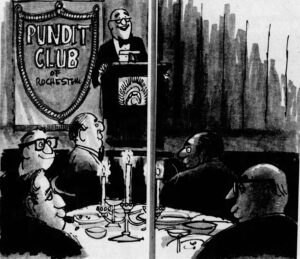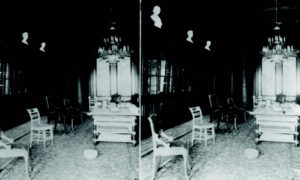Learned Men, Loyal Brothers: Morgan and “The Club”

Cartoon illustration showing Rochester’s upper-class men meeting at the “Pundit Club.” From Peter Prichard, “For Gentlemen Only,” Democrat and Chronicle (1975).
Rochester hosted a variety of literary clubs during the 19th century, but “The Club” remains the most prestigious and longest running. In 1854, Lewis Henry Morgan and University of Rochester president, Martin Brewer Anderson, founded The Club as a fraternity guided by the broad and diverse intellectual interests of its members. Participants included well-known men from the community—physicians, lawyers, businessmen, clergymen, and professors—who took turns presenting papers on topics of their choice. The wives of the members are said to have given The Club the nickname by which it is still known today: the Pundit Club.
Club Protocols
Club archives housed at the University of Rochester Department of Rare Books, Special Collections, and Preservation contain three volumes of handwritten notes by Club secretaries, one of whom was Lewis Henry Morgan. During his twelve-year service as secretary, Morgan created the model for taking minutes, noting each meeting’s host, members in attendance, title and author of papers presented, and any resolutions or noteworthy news, including memorials when a member passed away.

Stereographic picture. Mary Elizabeth and Lewis Henry Morgan’s library in their residence on Fitzhugh Street. Morgan hosted his final Club meeting in this library. Rare Books, Special Collections, and Preservation, Rush Rhees Library, University of Rochester.
Club meetings were held every two weeks at the homes of members. Papers were read aloud and followed by discussion and dinner. Only two topics were off limits: polemic theology and partisan politics. According to The Club’s records, its members cared a lot about the meal! The minutes record lengthy and lively talk of when and for how long the dinner should be held, and what the menu should be.
Research in Progress
Papers presented by Club members ranged from translations of classical literature to examinations of current science. For example, Martin Anderson, the first president of the University of Rochester, presented “Origin and Dispersion of the Celtic Races.” Rochester physician William Watson Ely spoke on Hippocrates, while Dr. Chester Dewey, a University of Rochester professor, shared the controversial theories of naturalist Louis Agassiz.

Statue of Martin Brewer Anderson on River Campus, University of Rochester. Photograph by Samuel Schacht.
The Club provided Morgan with a forum to develop his ideas on everything from the habits of the American beaver to the comparative study of human kinship. His many annual presentations to The Club foreshadowed his major publications.
Other literary associations such as the men’s Fortnightly Club and the women’s Roundabout Club modeled themselves on The Club, and the Rochester community generally admired Club members. Pundits led successful lives on many fronts, and Morgan was no different. As an accomplished businessman, father of three children, attorney, author, and state legislator, Morgan epitomized what it meant to be a member of The Club and a citizen of Rochester.

